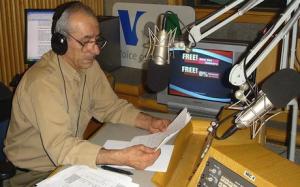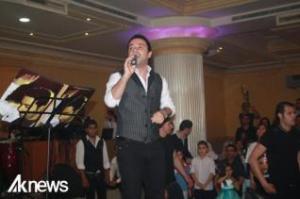
Khalaf Zebari: A Lifelong Voice of Kurdish Language and Culture

WASHINGTON DC - Earlier this month, at the Virginia hospital where he has been in a life-and-death struggle for a month, I went to visit Khalaf Zebari, whose voice is known to many Kurds around the world from Kurdish-language broadcasts of the Voice of America (VOA).
His wife Chiman, who was beside him at the intensive care unit, told me that doctors had told her he would not survive, and they should let him go. “No, I told them angrily,” she said. “I told them, ‘do everything you can.’”
My first contact with Zebari was over the phone 19 years ago, when I was a high school student in Turkey. His pure Kurdish accent and remarkable voice had fascinated me all the years I had tuned in to the VOA’s Kurdish programs.
His weekly show Ferheng û Toreya Kurdi or “Kurdish Literature and Culture” and Michael Chyet’s Zimane Me were my favorite programs. Zebari would interview Kurdish poets, writers or journalists around the world -- from Europe to the Middle East and from the former Soviet Union to Australia.
He talked about the Kurdish classical poets, love stories, legends and epics. It was thanks to his program that I learned a great deal about Kurdish literature, culture and oral tradition.
In 2004, when I met him face-to-face for the first time in Washington, I expected to see the tall, big man behind the imposing voice. I was surprised to see that Zebari was neither tall nor big. He was short and slender.
My friendship with Mamosta Zebari continued while I was in Turkey, and afterwards in Canada. After I moved to the United States in 2009, we became even closer. Together with Chiman, their two children Znar and Jvan and daughter-in-law Harez, they became a true family for me.
Besides being a true friend, Zebari has also been a great mentor and genuine role model for me. I had the privilege of working with him at the VOA Kurdish service for four years, where I got to know him better and tap into his deep knowledge of the Kurdish language, literature and culture. What he taught me about broadcasting guide me to this day in my profession.
Zebari was born on March 12, 1948 in the Zebar region of Akre in Iraqi Kurdistan. In 1970, he graduated from Mosul University with a B.A. in economics. Three years later, he joined the Kurdish Freedom Movement and began his career as a translator and news broadcaster at the Voice of Kurdistan. In March 1975, following the collapse of the Kurdish Movement, he sought refuge in Iran with thousands of other Kurds.
In 1977, he emigrated to the United States and settled with his wife and infant daughter in Nashville, Tennessee, where he began a new life. In 1981, Zebari published a magazine in Kurdish and Arabic named Denge Gel, or “The Voice of the People.”
He got into radio broadcasting in 1974, when the Iraqi army attacked Kurdistan.
“I started working for the Voice of Kurdistan, which was a radio run by the Kurdish movement. The program mostly was about the war operations, news of the war, of Iraqi attacks on the region. I had sympathy with the Kurdish movement like most of the young Kurds then,” according to Zebari’s recollections.
In 1975, after the end of the Kurdish uprising as hundreds of thousands of Iraqi Kurds became refugees in Iran, Zebari met his wife-to-be at a refugee camp in Iran. In 1976, they applied for asylum in the United States and shortly after moved to Nashville, where he joined his cousins and became part of the small Kurdish community.
For 15 years he worked at any job he could find, mostly in restaurants.
“I did many jobs, but I felt that I lived in freedom.” he said. “That was the most important for me! To go anywhere I wanted to, to talk about anything you have in mind.”
In 1991, he applied for a job at the VOA, where he worked until May 2012, when he was forced to retire due to deteriorating health.
Zebari grew up in a family of five brothers and two sisters. He left home to attend high school in town, where he began to write poetry, and then went on the study economics at the University of Mosul.
Although all his education was in Arabic, Zebari taught himself to read and write Kurdish. While still in high school he began writing poetry in his ethnic tongue. His first collection of poems was published in 1999, called Ware Seran or “The Land of Lions.”
“I wrote many poems about love, our homeland Kurdistan, Kurdish society, Newroz -- the Kurdish New Year and the symbol of freedom and national existence,” he recalled.
Many of Zebari’s poems also have been set to music, and have become popular songs. His poem Nesrin, which was composed by well-known Kurdish singer Mohammed Sheikho, is one of the most beloved songs in all four parts of Kurdistan.
Bo Kê Bikim Gazî û Hawar – “Who Shall I Call or Turn to” – was his cry when some 5,000 fellow Kurds were gassed to death in the town of Halabja by Saddam Hussein’s forces in 1988.
Who should I call or turn to? Should I turn to the same cold, frozen conscience, or to the deaf and silent world?, was Zebari’s lament.
Today, Zebari’s wife laments that she does not know who to turn to as doctor’s – who perhaps know nothing of this man’s struggle and role in lifting the Kurdish spirit during some of our worst times – say that he must die.
RUDAW
- 4564 reads


